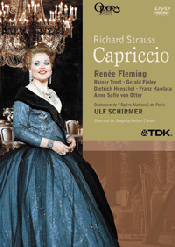Carsen’s work focuses on bringing energy and movement to this static work, a parlor debate about the primacy of music or words, especially in opera. A brother and sister of nobility act as patrons for a new work, and the young composer and librettist not only vie artistically for primacy, but also to be the Countess’ first choice as paramour (while her brother the Count pursues Clairon, an actress). Meanwhile the proposed director frets that his role is bring slighted, and in a long monologue proposes that without his guiding genius, neither music nor words would come to life. Finally all step aside to get to work, and then the Countess reenters to soliloquize on the glorious unresolved nature of the debate.
The set Carsen works with mirrors the great Paris hall the performance takes place in, with its ornate, golden columns. Although the libretto retains its many references to Gluck as a contemporary opera composer of note, the costumes reflect the era in which Strauss wrote the opera. Dark-clad Nazi officers stray through the set at one point, with no particular purpose in mind.
Now, video director Roussillon had the clever idea of directing a sort of preamble in which Renée Fleming glides through the lobby of the theater, so that all DVD viewers can understand the set’s significance, even if the viewers have never attended an opera in that house. Fine enough.
However, at opera’s end, a very distracting filmed sequence has the cast – including Miss Fleming – taking box seats in the theater to enjoy the Countess’ final monologue. The number of “meaningful glances” exchanged here far exceeds the limit that should be placed on any director, and a coy, artificial feeling that has dogged the entire performance finally overcomes the senses, to an unfortunate degree spoiling the effect of that lovely postlude.
The final stage coup, however, with all the scenery pulling away to reveal the bare interior of the stage, makes for a compensatory climax.
Capriccio is a fragile piece, and without being able to place blame in one exact area, something false about the production hampers and deadens the affair. Perhaps Carsen overdirected, as the performers all work just a bit too hard to have fun. Especially noteworthy here are the cartoonish Italian singers, with some unfunny slapstick. In the huge ensemble section, a compositional miracle from Strauss, the chaotic action distracts from the music’s effect, rather than supporting it.
Carsen certainly has a notable cast to work with. Apart from a couple of tight high notes, Fleming glories in the role, and her dramatic restraint, amidst all the other cavortings, is most welcome. Dietrich Henschel, looking remarkably like the American satirist Harry Shearer, may not be a plausible brother to Fleming but sings well. Rainer Trost and Gerald Finley both appear a little foolish a little too often, which is not their fault, but they have the vocal goods for the roles.
Franz Hawlata makes a huge meal out of his solo, but there is no real character there, in this production. Similarly, Anne Sofie von Otter’s Clarion is all caricature, though she is in good vocal shape and always a charismatic performer. Robert Tear’s little solo scene as the prompter, with the head servant (well played by Petri Lindroos), suffers also from a cartoonish spin. And as mentioned above, Barry Banks and Annamaria Dell’Oste really have to make monkeys of themselves. Yes, they are figures of satire, but as overplayed here, a mean edge creeps in that the creators probably did not intend. Furthermore, as Banks seems to be made up to look a bit like Carlo Bergonzi, those of us who revere the great tenor may find some offense there as well.
No, for Capriccio, surely first choice remains the 1993 San Francisco opera production, with Kiri te Kanawa leading an exemplary cast, including Tatiana Troyanos as a truly stunning and funny Clairon, caught not long before her untimely death. Donald Runnicles leads that performance. Ulf Schirmer and his fine orchestra cannot be faulted at all in this Paris production.
One last cavil – the odd acoustic. On one hand, the voices have perfect placement and any audience present makes not a single cough or rustle. On the other hand, one wonders after a while if the sound picture shouldn’t change a bit when a singer turns his back or moves from stage rear to the front. It does not. Your reviewer almost suspects that this performance was not filmed before a live audience. Although applause greets the end of the performance, no audience is ever shown, and the sense of a performance caught in pristine conditions comes through. The DVD case has no date for the recording, only “June 2004.”
Yes, the cast is great, the music well performed, the sets and costumes imaginative and detailed – but somehow this Capriccio is much, much less than the sum of its considerable parts.
Chris Mullins
Los Angeles Unified School District, Secondary Literacy
